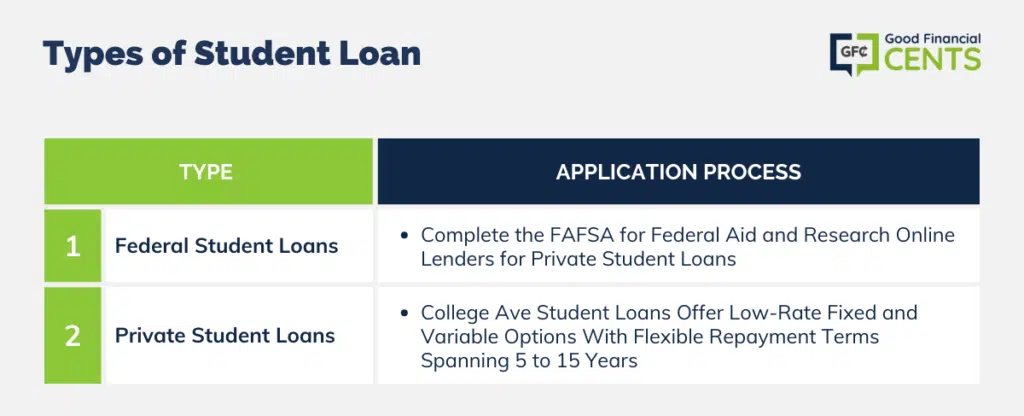College is far from cheap these days, and that’s true even when you go to an in-state school.
The College Board says that, on a national level, students paid an average of $10,230 for tuition and fees for four-year, in-state schools, and that doesn’t even include room and board.
If you include housing and meals in your planning, expect to fork over an average of $21,370 per year for public, in-state education.
With these figures in mind, it’s no wonder many students need to take out loans for college. It’s not feasible for most people to pay in cash — especially since college kids can’t always work while they go to school.
Table of Contents
What Is a Student Loan?
A student loan is a type of debt students take on in order to finance college tuition, fees, and living expenses while they finish college.
Just like any other type of loan, student loans charge interest on your balance that you’ll have to repay. However, with loans that are subsidized, the government takes care of the interest on your loans while you’re in school. With unsubsidized loans, interest starts accruing as soon as you take out the loan.
Some student loans — including Direct Subsidized Loans and Direct Unsubsidized Loans— grant you a grace period.
A grace period is an amount of time after you graduate or leave school before you must begin repaying your loans. Not all student loans come with a grace period, meaning some require you to make payments while you’re still in school.
Types of Student Loans
Federal Student Loans
In almost every situation, students should take advantage of any Federal student loans they qualify for first. Not only do Federal loans come with low fixed interest rates, but they also carry special benefits.
Direct Subsidized Loans and Direct Unsubsidized Loans for undergraduate students come with a fixed rate of 5.50% as of 2023, while Direct Unsubsidized Loans come with a slightly higher APR of 7.05%. Direct PLUS loans come with an APR of 8.05%.
If you have trouble making payments on your Federal student loans, you may be able to qualify for deferment or forbearance.
Both programs let you suspend your payments for a limited time. You can also consolidate your Federal loans with a Direct Consolidation Loan and/or extend your repayment timeline.
Another benefit of Federal student loans is the fact that they can help you qualify for income-driven repayment plans that let you pay a percentage of your discretionary income for 20-25 years before having your loans forgiven.
Federal student loans also come with the potential of having your student loans forgiven. If you work for a nonprofit or the government, you could qualify for Public Service Forgiveness, a major advantage of this funding source.
Private Student Loans
While Federal student loans are preferable in most cases, there are times when it makes sense to apply for a private student loan. Private student loans are offered by independent lenders who can set their own terms and rates, and they are often very competitive.
Keep in mind that it’s possible to find student loans with a private lender with rates as low as 3.25% APR.
That’s part of the reason many borrowers wind up refinancing their Federal student loans with a private lender. When the goal is paying off loans as quickly as possible, scoring a lower interest rate can help the process along.
Of course, some borrowers apply for private loans outright and not during a refinance. Private student loans can be a good option when you’ve borrowed up to Federal loan limits but still need money to finish your degree.
How Much Can You Borrow?
When it comes to borrowing money for college, your goal should be borrowing as little as you can. Remember, you’ll have to pay back every dollar you borrow, plus interest and fees.
Even borrowing a few extra thousand dollars per year can make your payments considerably higher, so you should strive to only borrow what you need.
With that being said, Federal student loans do come with limits that dictate how much you can borrow while you earn your degree.
For example, first-year undergraduate students who are dependent on their parents can only borrow up to $5,500, and only $3,500 can be in subsidized loans.
Second-year dependent undergraduate students can borrow up to $6,500, and third-year dependent undergrads and beyond can borrow up to $7,500.
Borrowing limits for independent students and graduate students are significantly higher. For example, graduate or professional students can only borrow up to $20,500 per year in unsubsidized loans.
How Do You Apply for Student Loans?
Federal Student Loans
If you plan to apply for Federal student loans, the first thing you need to do is fill out a Free Application for Federal Student Aid — or FAFSA form. The FAFSA form can help you determine whether you qualify for any Federal aid and, if so, how much.
If you plan to apply for private student loans, you should really do your research to see which lender might work best for your needs. Fortunately, this is easy to do online and from the comfort of your own home.
Private Student Loans
College Ave Student Loans offers fixed and variable rate student loans with low rates and flexible repayment terms.
They also let you repay your new loan over 5 to 15 years, which gives you the opportunity to pay more or less each month, depending on when you want your loans paid off.
College Ave also offers the most loan options and terms to choose from when compared to competitors like Sallie Mae and CommonBond. You can use the College Ave Student Loans calculator to find out ways to compare loan options and find ways to save.
The pre-qualification tool allows you to see what rates you may qualify for (without a hard check on your credit score). Either way, applying for private student loans is easy since you can complete the entire application process online.

What Happens If You Don’t Repay Your Loan?
One of the biggest downsides of student loans is the fact it is nearly impossible to discharge them in bankruptcy. This is true of both Federal and private student loans, too, so there’s really no way around it.
If you stop paying on your loans, they will go into eventual default and continue accruing interest and fees.
You may also be responsible for repaying collections charges and court fees.
Loans go into default at different rates once they become late — 360 days on federal student loans, and it can vary for private student loans.
The government may also be able to seize a percentage of your wages if you stop repaying your Federal student loans.
The Bottom Line – How Student Loans Work | Understanding the Basics
Attending college is a significant investment, often necessitating student loans to cover mounting costs. These loans, which aid in financing tuition, fees, and living expenses, come in two primary forms: Federal and Private.
Federal loans typically offer lower fixed interest rates and additional benefits, such as potential loan forgiveness for public service jobs.
On the other hand, private loans, provided by independent lenders, can have competitive rates and are useful when federal borrowing limits have been reached.
However, regardless of the loan type, students must exercise caution, as the inability to repay leads to severe consequences, including loan default and potential wage seizures. It’s essential to understand these intricacies to make informed financial decisions.







